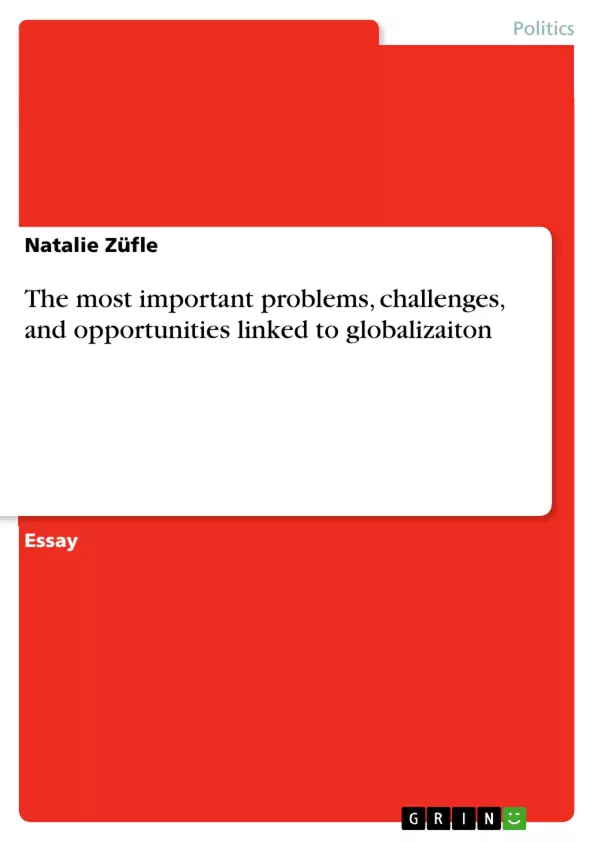This working paper analyzes some of the most relevant problems and opportunities for Germany in the course of globalization and proposes various solutions and measures to cope with the new challenges.
Inhaltsverzeichnis (Table of Contents)
- Background
- Issue
- Problems and Challenges
- Economy
- Politics
- Environment
- Crime and Terror
- Opportunities
- Economy
- Politics
- Environment
- Crime and Terror
- Conclusion
Zielsetzung und Themenschwerpunkte (Objectives and Key Themes)
This working paper examines the significant challenges and opportunities presented by globalization for a specific country. The author analyzes the impact of globalization on the economy, politics, environment, and crime and terrorism, proposing solutions and measures to address these challenges.
- The impact of globalization on national economies, particularly in terms of market liberalization and technological advancements.
- The changing political landscape within globalization, including the loss of national power and the rise of non-state actors.
- The global challenges of environmental issues and the need for international cooperation to address them.
- The emergence of new threats in the form of globalized terrorism and transnational crime.
- The potential benefits of globalization for national economies and the need for adaptation and strategic measures to harness these opportunities.
Zusammenfassung der Kapitel (Chapter Summaries)
The paper begins by outlining the concept of globalization and its growing influence since World War II. The author highlights the profound impact of globalization on various aspects of national life, emphasizing the interconnectedness of economies, cultures, and environmental challenges across borders. The subsequent section focuses on the problems and challenges posed by globalization. Specifically, the author addresses the potential economic consequences such as job losses, business closures, and the vulnerability of national economies to global financial crises. Further, the paper delves into the political implications of globalization, arguing that it leads to a decline in national sovereignty and an increase in the influence of non-state actors. The environmental chapter explores the global nature of environmental problems, emphasizing the difficulty of controlling pollution that transcends national boundaries. Finally, the section on crime and terror discusses the emergence of new forms of globalized terrorism and the challenges it presents for national security.
The paper concludes by exploring the opportunities presented by globalization, particularly in the economic realm. The author emphasizes the potential for increased national wealth through greater openness to investment flows and the removal of restrictive regulations. The paper also highlights the role of international cooperation in addressing global challenges, particularly in the areas of environmental protection and combating terrorism.
Schlüsselwörter (Keywords)
The key focus topics of this working paper include globalization, economic interdependence, technological advancements, market liberalization, national sovereignty, environmental challenges, global terrorism, transnational crime, international cooperation, and national competitiveness.
Frequently Asked Questions
What are the main economic problems caused by globalization?
Globalization can lead to job losses, business closures in certain sectors, and increased vulnerability of national economies to global financial crises.
How does globalization affect national sovereignty?
It often leads to a decline in national power as non-state actors gain influence and international agreements dictate national policies, reducing traditional sovereignty.
What are the environmental challenges of globalization?
Environmental problems transcend national boundaries, making it difficult for individual countries to control pollution and requiring intense international cooperation.
Can globalization help combat crime and terrorism?
While it allows for new forms of globalized terrorism, globalization also offers opportunities for international cooperation and shared intelligence to combat these threats.
What are the economic opportunities presented by globalization?
Globalization can increase national wealth through market liberalization, increased investment flows, and the removal of restrictive trade regulations.
- Arbeit zitieren
- Natalie Züfle (Autor:in), 2008, The most important problems, challenges, and opportunities linked to globalizaiton , München, GRIN Verlag, https://www.grin.com/document/180106



